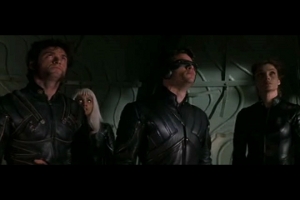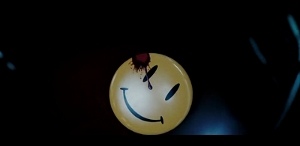
Now here’s a case study in adaption, a simultaneous example of how to successfully make a comic book movie and how to cock it up even as you’re supposedly doing “right” by both your fans and your studio backers. An unqualified box office success, X-Men ignited what I’ve come to call the Silver Age of Comic Book Movies, inaugurating trends and best practices that hamstring the genre to this day, despite elevating superhero flicks up to a level of respectability they’d never previously enjoyed…save, perhaps, for about a minute and a half there, after Tim Burton’s Batman.
Batman was a filmmaker’s film by a man who’s gone on to admit he’s never read a comic book in his life. (“Which,” as Kevin Smith put it, “explains Batman.”) At least X-Men‘s Bryan Singer had the good since to claim making his “comic book” movie helped him see the light. Before this, Singer was known for one decent thriller (Unusual Suspects) and one half-decent Stephen King adaption (Apt Pupil). Seeking to do a sci-fi picture, he nonetheless turned X-Men down three times…until producer Avi Arad convinced him to actually read the damn books…and watch some of the wonderful animated series Arad brought to Fox Kids for five season’s in the 90s. Continue reading X-Men (2000)

 As if anyone doesn’t already know, Watchmen is an award-winning, twelve-issue comic book created by the writer/magician Alan Moore and the artist Dave Gibbons, originally published by DC Comics in that dark and distant year of your lord, 1986. Steeped in Reagan-era pessimism and dreams of nuclear holocaust, the book did more for superhero storytelling than all Frank Miller’s work combined. It dragged the genre, kicking and screaming, into the late twentieth century, disguising its social relevance with a baroque self-reflexiveness now recognized as the hallmark of comic’s Iron Age.
As if anyone doesn’t already know, Watchmen is an award-winning, twelve-issue comic book created by the writer/magician Alan Moore and the artist Dave Gibbons, originally published by DC Comics in that dark and distant year of your lord, 1986. Steeped in Reagan-era pessimism and dreams of nuclear holocaust, the book did more for superhero storytelling than all Frank Miller’s work combined. It dragged the genre, kicking and screaming, into the late twentieth century, disguising its social relevance with a baroque self-reflexiveness now recognized as the hallmark of comic’s Iron Age.